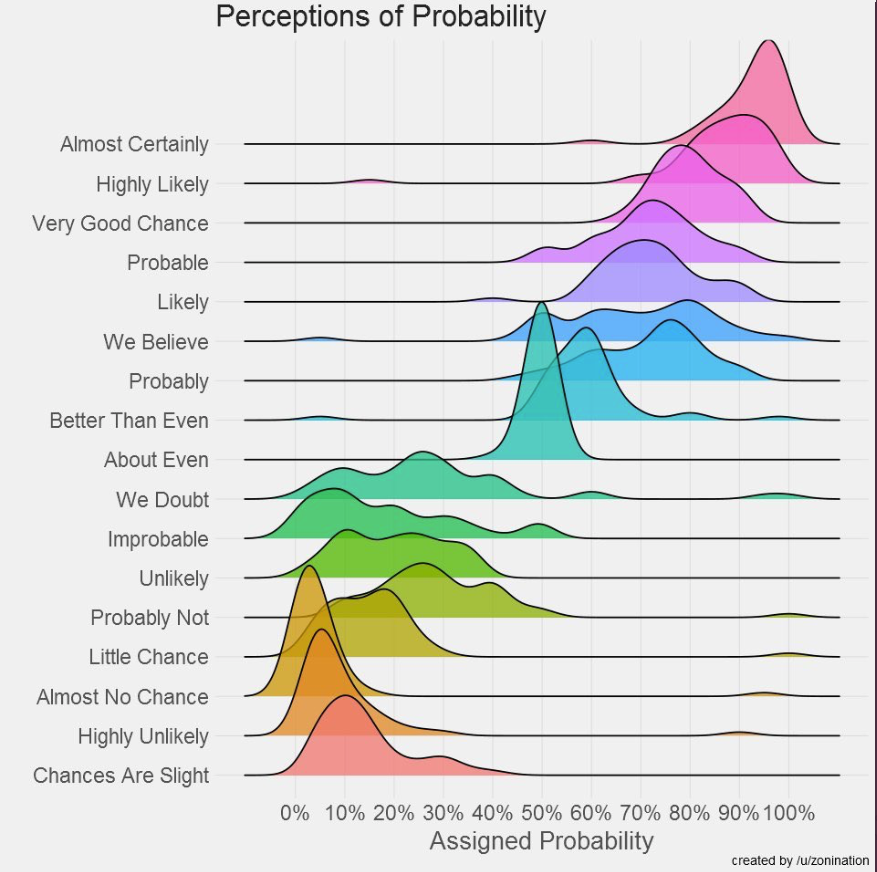The Ordinary Language of Likelihoods
There's a very good chance I like this illustration:

There's a very good chance I like this illustration:

In his recent article, "Is Sex 'Assigned' at Birth?," evolutionary biologist Colin Wright criticizes Planned Parenthood's claims that a doctor "assigns" a baby's sex at the time of birth. As Wright points out, a doctor merely notices and reports the baby's sex. Planned Parenthood's website makes as much sense as claiming that an obstetrician "assigns" a baby's two-leggedness or "assigns" the eye color of a newborn.
There's good reason to believe that Planned Parenthood intentionally misused the word "assign," given that this word appears 19 times on Planned Parenthood's highly problematic webpage, "Sex and Gender Identity." Here is an excerpt:
Sex is a label — male or female — that you’re assigned by a doctor at birth based on the genitals you’re born with and the chromosomes you have. It goes on your birth certificate . . . . Instead of saying “biological sex,” some people use the phrase “assigned male at birth” or “assigned female at birth.” This acknowledges that someone (often a doctor) is making a decision for someone else. The assignment of a biological sex may or may not align with what’s going on with a person’s body, how they feel, or how they identify.
Wright's article is a patient and focused response to yet another instance where activists are  attempting to use ideology to rewrite biology. Wright's counter-measure consists of serving up the kind of accurate biology lesson that most high school science teachers have uncontroversially delivered over many decades. That lesson goes something like this: "Here's a male mouse. Notice the penis. Here's a female mouse. Notice the vagina. Here's a diagram of a male human and a female human. Same thing. Quiz tomorrow."
attempting to use ideology to rewrite biology. Wright's counter-measure consists of serving up the kind of accurate biology lesson that most high school science teachers have uncontroversially delivered over many decades. That lesson goes something like this: "Here's a male mouse. Notice the penis. Here's a female mouse. Notice the vagina. Here's a diagram of a male human and a female human. Same thing. Quiz tomorrow."
Real-life biology is something that many Critical Justice Activists have self-trained themselves to find irrelevant. They also find real-life biology incomplete--those biology books keep forgetting to talk about feelings when they discuss gonads! Many of today's Woke students don't like hearing any blunt talk that they are human animals or that it is Nature (not a doctor) that calls the shots regard to a baby's sex. Wright explains:
The claim that biological sex is “assigned at birth” is very misleading as it draws a false equivalence between transgender and intersex people, and suggests that identity, as opposed to reproductive anatomy, defines one’s biological sex.Rather than being “assigned” at birth, sex is simply recorded at birth using genitalia as a very reliable predictor of underlying gonad type. The fact that doctors, on very rare occasions, are wrong in their assessment does not therefore immediately call everyone’s sex into question.
Planned Parenthood employs many highly educated and careful writers, so the wording on its website was not an accident. Planned Parenthood consciously decided to use the word "assigned" to falsely suggest that arrogant doctors steeped in scientism shoot from the hip whenever they designate a baby's sex. That's how I read their ideologically-laced webpage. They take this position despite the fact that the sex of almost every baby is determined about nine months prior to the birth. And once the baby is born, figuring out whether Nature chose pink versus blue is truly simple. Truly, a doctor merely needs to take a quick look. This process of sexing was perfected thousands of years before the patriarchy got around to inventing the multitudes of modern baby doctors, those people who arrogantly determine one's sex by looking at gonads.
I can feel Wright's frustration as he spells out the facts of life for activists (as well as for those of us who are unnerved by the vocal Woke mobs). This effort by Wright is merely the most recent of a series of basic sex-ed lessons he has been offering (see also here and here). It's unfortunate that any of his articles were necessary, but I'm relieved to see that he is out there offering accurate biology bit by bit, to try to keep us all on the rails.
What is my main reason for writing this article? Because new parents should never be made to feel any hesitation or shame when they announce "It's a girl!" or "It's a boy!" We have all heard many people announcing and celebrating the sex of their newborns. On every occasion that I've heard such an announcement, I'm certain that there was no hint of any animosity toward people who have undergone the process of transgendering. Announcing a baby's sex is always a perfectly appropriate thing to do, no footnotes and no asterisks needed. These joyous moments have no relevance to the hyper-sensitive feelings of transgender activists. In fact, if there were activists in my presence right now, I would urge them to each put one finger in one their own ears so the following information might stick: "When new parents joyously exclaim 'It's a girl!', this is an undeniable biological fact that has absolutely nothing to do with you. It's about the baby."
Since Planned Parenthood twice mentioned "intersex" on the above webpage, it's worth asking how often doctors get it wrong when they tell the parents what sex they have observed in the newborn baby. The answer: almost never. As Wright discusses, the reproductive anatomy of a baby is unambiguously male or female over 99.98 percent of the time. Many activists seem to think that it is insensitive to bluntly announce the sex of a baby because of "intersex." They claim this even when only 2 out of 10,000 newborns are diagnosed with intersex conditions. They claim this despite the fact that intersex conditions have absolutely nothing to do with the issue of transgendering. I suspect that transgender activists keep bringing up intersex conditions because it confuses and extends what would otherwise be swift endings to bad arguments.
Planned Parenthood, an organization claiming an expertise in medical matters, needs to get its medical facts right, then revise its webpage accordingly. There's a lot of work to do. One thing they desperately need to be add is this: For the great majority of people, biological sex robustly aligns with gender. This fact is not something shameful, insensitive or mean-spirited. It accurately describes most human beings, except in Planned Parenthood's namby-pamby world of biology where this is a fact that must not be uttered. [More . . . ]
Bryan Garner, renowned for his many books on legal writing, argued his first case at the United States Supreme Court. Here's an excerpt from the article: "Supreme Court Justices Appeared Dazzled by Legal Celebrity at Oral Arguments in Robocall Case Against Facebook":
In his authoritative baritone, which came through even in telephonic oral arguments, Garner walked the justices through his arguments on what statutory wording really meant and how it should be applied to Facebook’s wrongdoing. As Garner nimbly led the justices through a discussion of adverbial modifiers, “viperine” interpretation of statutes, and conjunctive versus disjunctive distinctions, the justices appeared content to assume the position as students in Garner’s classroom.
Linguist John McWhorter discusses his personal struggle to get used to "they" as a singular third person pronoun in this article at The Atlantic, "Call Them What They Wants: As more English speakers adopt the singular they and reject the gender binary, resisters will have to accept that language changes over time." McWhorter wrote this article all the way back in 2018. I timidly entered those third-person-singular waters back after reading this article in 2018 and now I'm rather comfortable with it. In fact, I find it liberating. How convenient to get rid of the cumbersome pronoun dyad "he or she" cluttering up the ends of my sentences! What a difference a couple of years make.
McWhorter's article covers more ground than simply this one usage. He gives us a robust reminder that language is always morphing, always on the move, just like the people who use language. Here's an excerpt from McWhorter's article:
It is certainly the most challenging change in language I have dealt with in my lifetime. Ever more people, rejecting the gender binary, are requesting to be referred to as they rather than as he or she. That is, we now say: Ariella isn't wearing the green one. They think it's time to wear their other one. I expect to get some new practice using they this way as school starts back up, with more students at universities such as the one where I teach requesting they.
Yes, practice—I am trying my best to master this new way of using they despite the fact that, make no mistake, it's hard. In contrast to the deliberateness of writing, speaking casually is a largely subconscious, not to mention very rapid, act. In addition, pronouns, like conjunctions and suffixes, are a very deeply seated feature of language, generated from way down deep in our minds, linked to something as fundamental to human conception as selfhood in relation to the other and others. I've been using they in one way since the late 1960s, and was hardly expecting to have to learn a new way of using it decades later. I thought I had English pretty much under my belt.
However, just as words’ meanings are always changing—what Shakespeare meant by generous was “noble,” not “magnanimous”—pronouns never sit still. What kind of sense does it make that in Italian, lei means both she and the polite you? Isn’t it even more senseless that in German, sie (or Sie) means she, polite you, and they? Or what kind of sense does it make that in English, we use you in both the singular and the plural? Nothing feels more natural today, but in earlier English, thou was the second-person-singular form, and you was used only for two or more people.
More and more people cannot bear to say words like "men" and "women" anymore. Talk about "objectifying" sexuality . . . Consider this recent article from Healthline:
Here's an excerpt:
‘Do Vulva Owners Like Sex?’ Is the Wrong Question — Here’s What You Should Ask Instead. . . . Some do like sex and some don’t. Just like some penis owners like sex and some don’t.Here's an article about a recent ad by Tampa. Same issue:This question, in and of itself, isn’t great, though. It makes some broad generalizations and assumptions about people and sex in general.
So instead of asking whether vulva owners like sex, you should really be focusing on the person you want to have sex with, and ask them how they feel, what they want, and what they need.